by Allen Reynolds, UrbanFaith Editor | Jul 21, 2022 | Commentary, Headline News, Relationships |

Sex is a good thing. For all human history, human beings have had sex and been aware of their sexuality. It is a fundamental function of creation to reproduce that God instituted from the beginning. But sexuality is not simply about reproduction. It is about the awareness and expression of our bodies. We are spiritual beings, but we are also natural beings. God created us that way on purpose. If we were meant to be all spiritual, we would have been created like angels, but God made us from the earth on purpose. Jesus Christ came to us IN THE FLESH, not as a spiritual principle, a vision, or a disembodied being. Jesus was circumcised on the 8th day according to Jewish law, as all Jews were. This was a sexual act with spiritual meaning that is literally at the heart of the Old Covenant. Unfortunately, as New Covenant Christians we often overfocus on the spirit and miss the fact that the New Covenant is literally made because of Jesus’ BODY broken for us and blood shed for us. It is Jesus’ humanity, not spirit that is the sacrifice that reunites us with God. The conversation is different depending on your stage of life. Believers who are married with kids need to have different conversations than single believers in early adulthood, or teenagers, or those who are divorced, or single after the death of a spouse. But regardless of our age or station in life we need to do a better job having these conversations as Christians. Here are 3 major reasons why Christians need to talk about sex.
-
God created us to be sexual beings
Every person was designed to be sexual, and that goes far beyond having sex. When God created Adam and Eve, they were meant to relate to one another sexually and their relationship to be closer than parent to child in future generations. They were naked and unashamed of their bodies (Genesis 2:24-35). There are any number of reasons why believers are ashamed of their sexuality today, many of them unfortunately from bad teaching in churches. But that is not the design of God. We were created to relate to one another sexually BEFORE sin entered the world.
-
Christian sexuality is meant to be different
A lot of our confusion, angst, shame, sorrow, and frustration with reconciling our sexuality with our faith is because of a Biblical principle that Christian sex is meant to be different than sexuality for those who don’t follow Christ. The covenant between God and Abraham made Israelite men sexually different from their neighbors in other nations (Genesis 17). The Law of Moses set up sexual limitations and regulations that were meant to distinguish Israel from other nations. The principle always pushed toward relationship with God reflected in our sexual relationships with others. The word used in scripture is holy, but to translate that our modern culture we might say intentional, purposeful difference that honors God. Paul picks up this Jewish principle in the New Testament by articulating a vision of sexual relationships that is monogamous, mutual, caring, and loving that reflect Christ’s love. We have often been caught up on the restrictions and missed the vision in the church. We have to be responsible with our sexuality because we are accountable to God in a different way as followers of Christ. We are called to be vulnerable, loving, and intentional with our sexuality in a way that is different than the world around us.
-
We should love and not fear our sexuality
1 John 4:18 reminds us that perfect love casts out all fear. The world has set false standards that promote fear, violence, and mistrust in sexual relationships. We have no need to rehearse the many ways popular culture, corporate interests, and sociopolitical forces use and abuse sexuality. Often their goals are to use sex to make money and create false intimacy. But for many believers we have been taught to fear sexuality to maintain holiness. It has caused believers to have arrested development, face shame and ridicule, leave churches, and seek unhealthy sources to define their sexuality. We rarely speak of the difficulties many newly married Christian couples face around sexual expectations, communication, and formation because of ignorance, self-rejection, and fear. We do not talk about the struggles teenagers face with loving their bodies instead of hating and fearing them. We do not deal with the choice to not have sex as young adults instead of treating sex as an uncontrollable inevitable impulse. We are afraid of the word intimate because we have been taught it is dirty. Our bodies are not beasts to be tamed. They are part of us to be loved. Paul Himself would agree with this, treating our bodies as a Temple of God means loving and tending to them with the utmost care (1 Corinthians 6:19-20). Not fearing and avoiding them as we abuse them and let them be abused by others. But Jesus loves us. He loves our bodies. He wants us to love God with our bodies just as we do with our minds and hearts. And we make sexual choices that build intimacy and protection with our romantic partner. We do not discuss the why of a holistic view of Christian sexuality which sets us up for pain before and during marriage. But we should talk about sex. We should love our bodies and our sexuality. We should define what sexual holiness means as believers in terms of what we choose to do instead of what we feel we can’t do. We should honor God’s design for sexuality by loving our neighbors as we love ourselves, sexuality included.
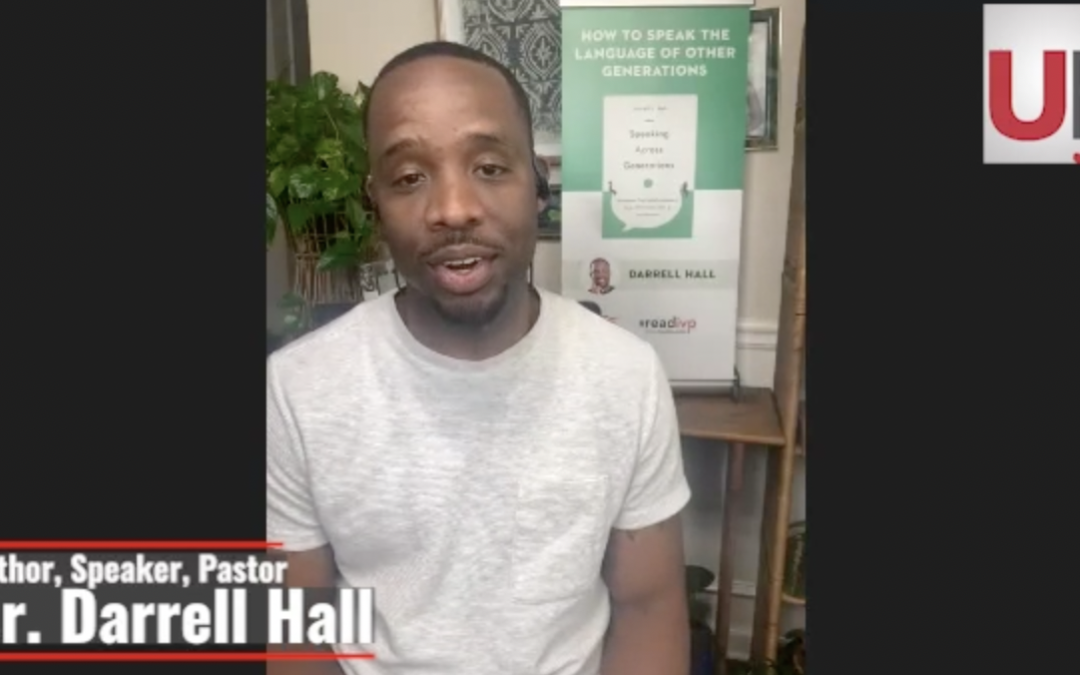
by Maina Mwaura, Urban Faith Contributing Writer | Jul 19, 2022 | Commentary, Headline News, Relationships |
As we emerge from the global lockdown of the pandemic many institutions, organizations, and individuals are having to rethink what it means to connect and communicate. The Church is faced more than ever with how to reach across generational lines to survive and thrive in the new world. Dr. Darrell Hall has been in ministry for decades and now has quantitative and qualitative research to help churches reach multigenerational communities. UrbanFaith sat down with Darrell Hall to discuss his new book Speaking Across Generations.
#multigenerational #church #generationalknowledge #faith #christianity #atlanta #genx #genz #babyboomers #millennials #onechurch #community

by Alan Marshall II | Jul 15, 2022 | Commentary, Faith & Work, Headline News |

For years, I struggled to reconcile my passion for ministry and the marketplace. As a young minister, I found myself equally intrigued by the stories of great evangelists and the stories of entrepreneurs that used their influence to change the world. While the aspiration to be like the men and women I admired was immense, my reality painted a different picture. I was broke. Not only was I broke, but I faced the hard truth that I did not have the financial resources to accomplish what I felt God was calling me to do in ministry. Please don’t get me wrong, money does not make a ministry successful, but it sure does help. After all, the Bible states: “Money answers everything.” (Ecclesiastes 10:19).
As a Campus Staff Minister at a major Christian non-profit, I was tasked with raising a substantial budget to support the work of ministering the Gospel to students at Wesleyan University. After eight months of meeting with fundraising coaches and pitching the ministry to over 200 potential philanthropic partners, I was only able to raise half of my original fundraising goal. Little did I know that my failure to secure funding would be the catalyst to discovering my destiny in Christ.
Like many other young ministers, my desire to be an entrepreneur was distinctly separate from my desire to preach the Gospel. Because of this, I attributed my failures to lack of networks, lack of skill, and poor personal leadership, only to find that the deeper issue at play was that I was inauthentically engaging the call of God on my life. God called me to be a minister and an entrepreneur. In essence, an “EntreVangelist.”
I had spent nearly a decade preaching, serving on non-profit executive boards, traveling on missions nationally and internationally, and ministering in my local church. Yet, I never thought of taking the skills I acquired in ministry into the marketplace until I received what seemed to be a random call from a multi-millionaire asking me to work for him. He remembered my fundraising pitch from years ago. Now, it was his chance to pitch his multimillion-dollar project to me.
During the interview, I listened intently, mentally documented the areas needed for improvement, and made a suggestion that changed the project’s trajectory. Within a few weeks, I became the lead consultant. From that point on, I leveraged the skills I learned in ministry to lead a team of consultants, hire staff, and successfully pitch the project to city officials. While this opportunity transitioned me into a better understanding of God’s will for my life, I realized that I was internally conflicted by my desire to minister outside of the confines of the box I created around my calling. To address this internal struggle, I needed to clear up a misconception within myself regarding ministering in the marketplace.
 Misconception: Ministry and the Marketplace Must be Separate
Misconception: Ministry and the Marketplace Must be Separate
The misconception that deterred me from merging my skills in ministry and the marketplace was that I believed they were distinctly separate. Remember the story in the Bible where Jesus entered the temple courts and drove the money changers and merchants out of the temple? Well, for many that Scripture has been used to justify a separation between business and church; however, when one takes a closer look at Matthew 21:13, they will notice that Jesus declares: “My house will be called a house of prayer,’ but you are making it ‘a den of robbers.” This narrative focuses on the merchants and money changers perverting the House of God for personal gain. When Jesus forcefully redirects those exploiting the temple, He re-shifts the focus back to its primary use as a house of prayer. So, does this justify that the church and business should remain separate? The answer is no.
One thing to consider is that churches in America are legally and practically a business. Many, if not most churches have budgets, paid and volunteer staff, insurance, and boards of directors. In fact, the estimated hundreds of thousands of Protestant churches in America collect billions in revenue each year. They provide services, strategic planning, community development, networking events, conferences, and workshops that are considered valuable services in secular industries. A critical concept to understand is that the Church is a business and a ministry. As stewards entrusted with leading both, we should never forget that the primary function of the Church must always remain for the worship of God.
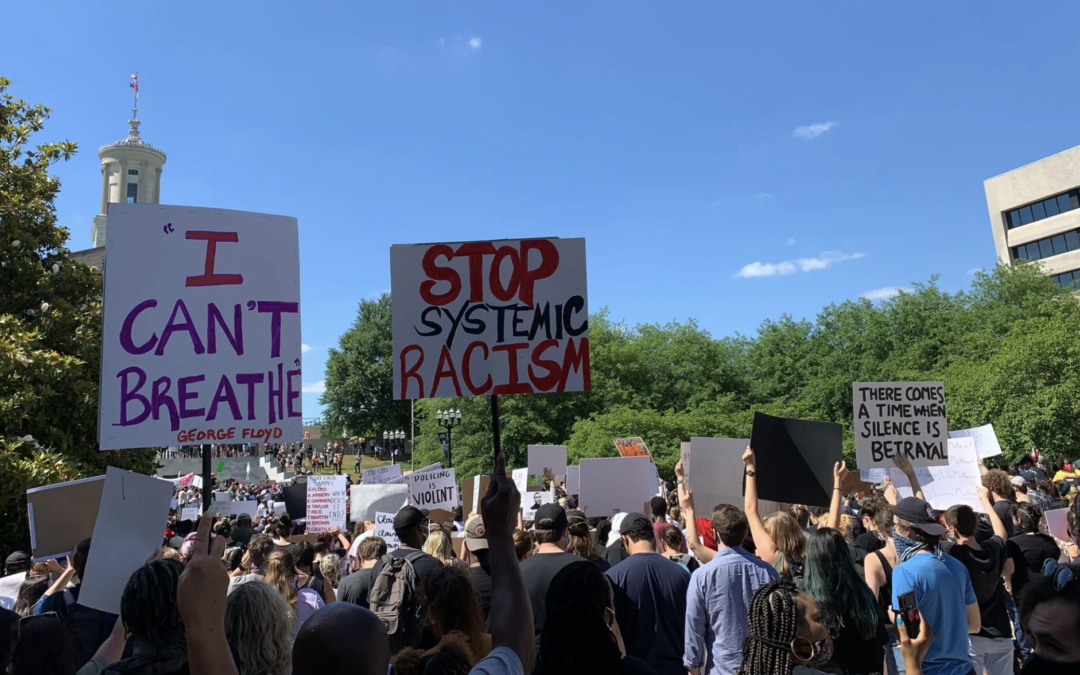
by Maina Mwaura, Urban Faith Contributing Writer | Jul 13, 2022 | Commentary, Headline News, Social Justice |
The unjust killings of African Americans at the hands of law enforcement over the past several years have become all too common news. But New York Times bestselling author Marc Lamont Hill and his co-author Todd Brewster masterfully weave together the strands of social justice uprisings, technology, and social media to talk about how the deaths of black people by police led to viral and physical social justice movements that have reshaped our national discourse.
UrbanFaith contributor Maina Mwaura spent a few moments with Marc Lamont Hill to discuss his the new book Seen & Unseen: Technology, Social Media & the Fight For Racial Justice. The full interview is above. More about the book is below.
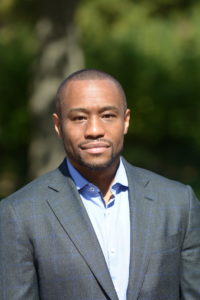 With his signature “clear and courageous” (Cornel West) voice Marc Lamont Hill and New York Times bestselling author Todd Brewster weave four recent pivotal moments in America’s racial divide into their disturbing historical context—starting with the killing of George Floyd—Seen and Unseen reveals the connections between our current news headlines and social media feeds and the country’s long struggle against racism.
With his signature “clear and courageous” (Cornel West) voice Marc Lamont Hill and New York Times bestselling author Todd Brewster weave four recent pivotal moments in America’s racial divide into their disturbing historical context—starting with the killing of George Floyd—Seen and Unseen reveals the connections between our current news headlines and social media feeds and the country’s long struggle against racism.
For most of American history, our media has reinforced and promoted racism. But with the immediacy of modern technology—the ubiquity of smartphones, social media, and the internet—that long history is now in flux. From the teenager who caught George Floyd’s killing on camera to the citizens who held prosecutors accountable for properly investigating the killing of Ahmaud Arbery, ordinary people are now able to reveal injustice in a more immediate way. As broad movements to overhaul policing, housing, and schooling gain new vitality, Seen and Unseen demonstrates that change starts with the raw evidence of those recording history on the front lines.
In the vein of The New Jim Crow and Caste, Seen and Unseen incisively explores what connects our moment to the history of race in America but also what makes today different from the civil rights movements of the past and what it will ultimately take to push social justice forward.
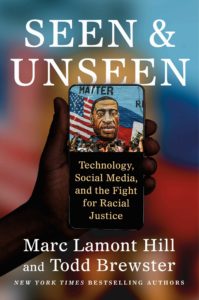
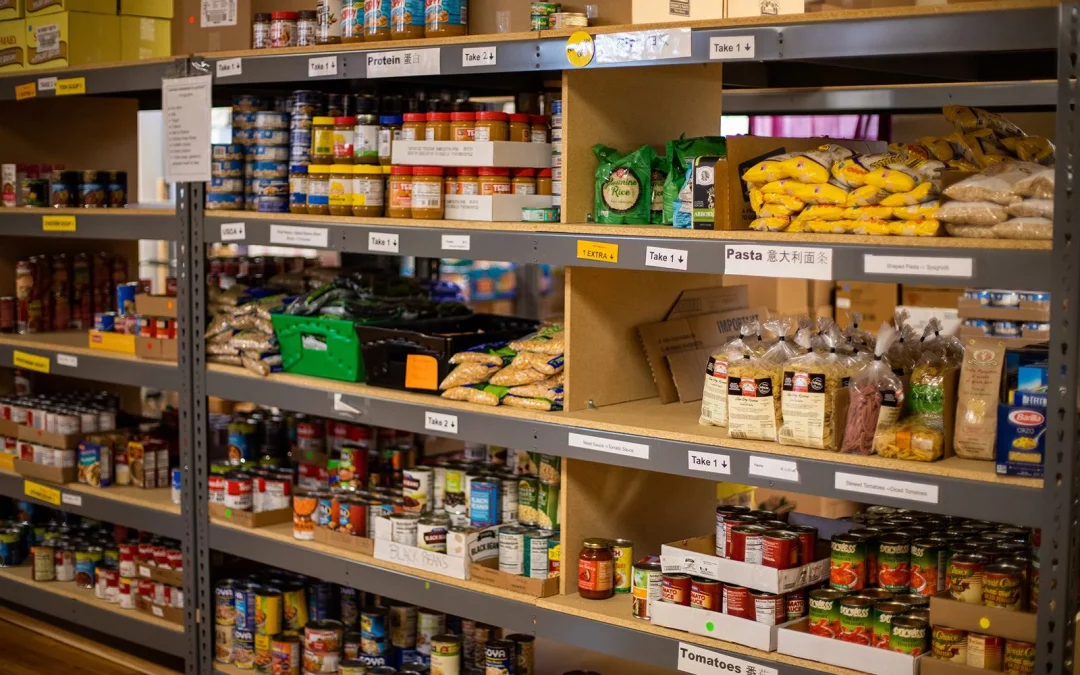
by Haley Barker, Riley Farrell, and Marika Proctor (RNS) | Jul 7, 2022 | Commentary, Headline News, Social Justice |
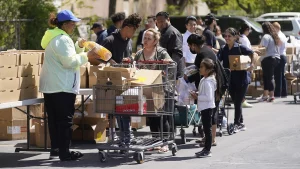
(RNS) — At the Seven Loaves Food Pantry at St. Andrew’s United Methodist Church in Plano, Texas, volunteers have been serving 800 to 1,200 families a week since the COVID-19 pandemic began — about four times the weekly traffic in 2019.
At the ICNA Relief Food Pantry in Raytown, Missouri, just east of Kansas City, 100 new families have registered to receive the Muslim-led organization’s services in just the past month.
“We are busier than ever right now,” said Shannon Cameron, executive director of the Aurora Area Interfaith Food Pantry in Aurora, Illinois, where, after a slight dip around tax return season, between 30 and 60 new families are registering every week.
The inflation that has loomed over the economy and restricted many Americans’ purchasing power of late has doubly affected low-income people who already struggle to get by. A recent survey by the anti-hunger organization Feeding America has shown that increased demand has affected nearly 80% of U.S. food banks, as higher prices cause more families to seek assistance.
And while President Joe Biden recently signed the Keep Kids Fed Act, extending free meal programs for schoolchildren, many stopgaps funded during the pandemic have ended or are only available in some states.
“For the households that were already food insecure in 2020, nearly half of those reported using a food pantry,” said Jordan Teague, interim director for policy analysis and coalition building at Bread for the World. “Now, more people are facing the crisis. We’re all sort of feeling that pinch, and government programs are coming to an end.”
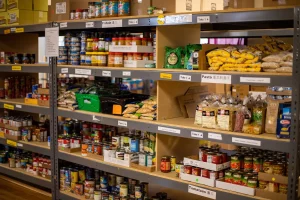
Since the 1980s, the U.S. Department of Agriculture has donated surplus commodities it buys to stabilize farm prices to the Charitable Food Assistance System, a network of food banks. For four years, the Trump administration bolstered the program to offset the cost of its tariff increases, raising the share of the USDA’s contributions to as much as 15% of some food banks’ supplies. Those resources, too, have now tailed off.
“We saw a real increase even before the pandemic hit in those USDA commodities and, obviously, during the pandemic, USDA made more commodities available as well,” said Celia Cole, CEO of Feeding Texas, a faith-based food security organization based in Austin. “Now, without them, we’re seeing a drop-off.”
Food banks are looking more than ever to make up the gaps with private monetary donations, and government financial assistance. “For every dollar donated to a food bank, we can stretch it to four meals,” said Cole. “We encourage people to be educated with their elected officials in support of hunger-fighting programs like SNAP and the Child Nutrition Programs.”
Historically high gas prices have added further strain on local food pantries, causing delays in the transport of food from farm to market, and from market to food banks.
“We own a fleet of semis,” said Mike Hoffman, inventory and logistics director at Midwest Food Bank, a Christian charity that supplies more than 2,000 churches, nonprofits and community centers across the country. “Fuel prices have taken a toll. We’ve gone through our entire year’s fuel budget in the first five months.”
The same supply chain problems, including a lack of available truck drivers, that have beset the economy apply to fighting hunger as well. Barbara Wojtklewicz, part of the leadership team that runs the food pantry at Christ Church in Plymouth, Massachusetts, said staff at the Greater Boston Food Bank, a regional network of 600 food distributors, have reported driver shortages recently.
“There is ample food to distribute,” Wojtklewicz told Religion News Service, “but they’ve had to limit … distribution to different food pantries.”
Maj. Deb Coolidge at the Salvation Army’s food distribution center in Plymouth has had trouble sourcing fresh food. “Less salad mix and cucumber — oranges and apples,” Coolidge said. “Those have not been on the list for the last couple of months.”
At ICNA Relief in Missouri, Ferdous Hossain, associate operations coordinator, has likewise found it increasingly difficult to provide fresh produce to the 300 families who rely on the pantry for food assistance each month. Local agencies, farms and food banks that ICNA collaborates with are also feeling the produce pinch.
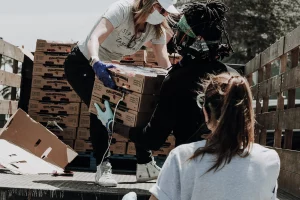 To live up to her center’s unofficial motto — “Fresh produce. Fresh fruit. Anything and everything that is fresh” — Hossain has been buying produce at the grocery store, a last resort because of higher prices.
To live up to her center’s unofficial motto — “Fresh produce. Fresh fruit. Anything and everything that is fresh” — Hossain has been buying produce at the grocery store, a last resort because of higher prices.
Donors are also stepping up, thinking creatively to help fill the gaps. Wojtklewicz said that the Christ Church pantry in Plymouth received 100 gift cards to local grocery stores along with its shipment from the Greater Boston Food Bank.
As economists prepare Americans for a possible recession, Beth Zarate, president and CEO of Catholic Charities West Virginia, expressed “anxiety” about the rural residents in her state and their ability to stay ahead of increased gas prices and food costs. At 15.1%, West Virginia has the highest percentage of households facing hunger, according to a 2020 USDA study.
Zarate is counting on West Virginians to come to their neighbors’ aid. “West Virginia is unique because we come out at the bottom of every chart in terms of chronic health issues, hunger and poverty,” Zarate said. “But we also have people who are good to each other.”
“People are generous,” said Darra Slagle, director of Rose’s Bounty, a food pantry operating out of Stratford Street United Church in Boston, “and when they are made aware of the need, are able to help. I encourage people to give to their local food pantries. They could use money to get the things that they need.”
Hoffman at the Midwest Food Bank said prayer is another life raft for anti-hunger operations.
“We have a lot of prayer warriors,” he said. “The faith community is a huge part of what we do, (and) many churches pray for us. The Bible says, ‘The poor you’ll have with you always,’ so we know we have a job that needs to be done, and we’ll keep getting it done.”
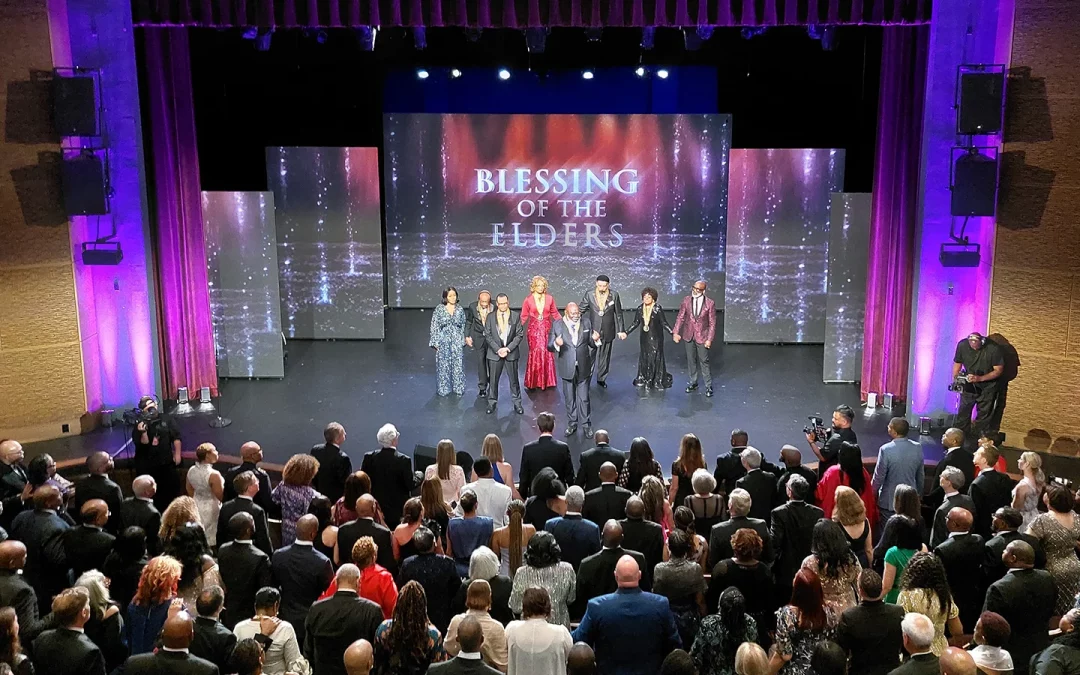
by Adelle M. Banks, RNS | Jul 1, 2022 | Commentary, Headline News |
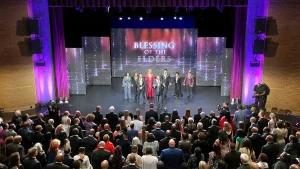
WASHINGTON (RNS) — Well-known names from the world of gospel music and the Black church gathered at the Museum of the Bible to hail the contributions of African American churches and to call for continued efforts toward building unity and bridging divides.
The “Blessing of the Elders,” an awards celebration held Thursday (June 23) just blocks from the U.S. Capitol, specifically honored seven leaders known for their contributions in megachurches, denominational leadership, civil rights, music and religious broadcasting.
The Rev. A.R. Bernard, an honoree and a Brooklyn, New York, pastor, described the Black church, in its varied expressions, as a repository of Black culture in America.
“Embracing Christianity, Blacks didn’t seek to imitate white Christianity — oh no, instead we created a parallel religious culture, our own brand of Christianity with our own hymns, music, style of worship, much influenced by the challenge of slavery,” Bernard said in the museum’s World Stage Theater.
“Christianity gave Blacks hope in the midst of a hopeless situation, and we’re not done yet. I believe the 21st century will see the Black church lead the way to hope and healing in a deeply divided nation.”
One honoree, Bishop Charles E. Blake Sr., the former top leader of the Church of God in Christ, was unable to attend due to medical reasons.
“Bishop Blake wanted me to tell you he was sorry he couldn’t be here,” said Harry Hargrave, chief executive officer of the Museum of the Bible. “He’s coming off of COVID. He’s feeling much better.”
Jon Sharpe, the museum’s chief relations officer, and the Rev. Tony Lowden, pastor of the Georgia church where former President Jimmy Carter is a member, took the stage to explain how the predominantly Black gathering came to be.
Sharpe said he had a vision two decades ago that “the Black church is going to lead spiritual renewal in America.”
The museum executive, who is white, shared his idea over dinner with Lowden, an African American man who had attended a 2020 fatherhood conference at the museum. Lowden said the concept — which Bernard now calls a “movement” — resonated with him.
“There was a move that we had to answer, asking us to come together, go around the nation to talk about how we can bring the Black church together to lead,” Lowden said.
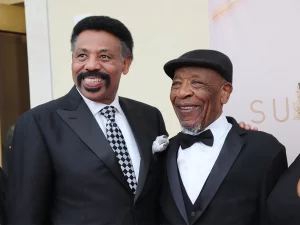 Over the course of the more than three-hour ceremony, coming together and overcoming were recurrent themes.
Over the course of the more than three-hour ceremony, coming together and overcoming were recurrent themes.
“The only way we can go forward now is with ‘love one another,’” said honoree John Perkins, a civil rights veteran and reconciliation advocate, quoting the New Testament book of 1 John and elevating the church as a whole over congregations attended by Black or white people. “‘He that loves knoweth God. He that loveth not knoweth not God.’”
North Carolina pastor Shirley Caesar, an honoree known for her award-winning gospel singing, spoke of worshipping in the “red church,” based on the sacrifice of Jesus, rather than at a Black church or a white church.
And Dallas pastor Tony Evans also spoke of a unified church, saying, “It’s time to go public as the Black church and white church of the kingdom of God, the glory of God and the advancement of his rule in history. It’s time for the church to lead the way.”
Bishop Vashti McKenzie, an honoree and the first woman prelate in the more than 200-year-old African Methodist Episcopal Church, said she accepted her award “on behalf of women who have been pushed to the margins of church culture, yet their gifts continue to make room for them.” As McKenzie stood between her daughter and granddaughter, whom she asked to join her on stage, she urged others to adhere to the biblical admonition to “stand firm.”
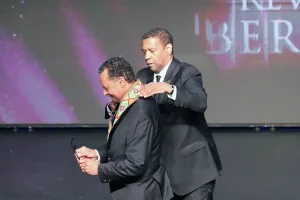 Actor and producer Denzel Washington, one of the presenters at the event, noted his spiritual trajectory was shaped by two of the evening’s honorees as they led churches on opposite U.S. coasts — Blake’s West Angeles Church of God in Christ in Los Angeles and Bernard’s Christian Cultural Center in Brooklyn.
Actor and producer Denzel Washington, one of the presenters at the event, noted his spiritual trajectory was shaped by two of the evening’s honorees as they led churches on opposite U.S. coasts — Blake’s West Angeles Church of God in Christ in Los Angeles and Bernard’s Christian Cultural Center in Brooklyn.
“It’s been an amazing 40-year journey from Bishop Blake’s church, where I first was filled with the Holy Spirit, to tonight,” Washington said, noting that Bernard, “a man of God with a mind of God,” had asked the actor to speak during his time of tribute. “It has been a blessing for all of us to be students of Pastor A.R. Bernard. It’s been a blessing for me personally to have someone that I can talk to, ask questions.”
Between prayers and speeches, a range of Black church music was featured, including from co-hosts BeBe Winans and Erica Campbell — who also harmonized a bit of “Amazing Grace” while awaiting a working teleprompter. Wintley Phipps, Pastor Marvin Winans, Lecrae, the Clark Sisters, Tramaine Hawkins, Fred Hammond and Anthony Brown & group therAPy also performed.
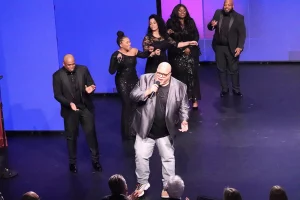
The Blessing of the Elders initiative, which thus far has included a steering committee and been supported by the Museum of the Bible and partnering foundations, individuals and corporate sponsors, is now a not-for-profit corporation that Bernard will chair. In an interview before the gala, he said its next steps could include a documentary, an exhibit or a curriculum about the history of the Black church that would be particularly intended for white churches “to walk a mile in our shoes.”
Steve Green, board chair and founder of the museum, said in a separate interview that a temporary exhibit centered on the Black church — delving more into the subject than what is already featured in its Bible in America permanent exhibit — is a possibility at his facility.
“To be able to do a deep dive within the Black community and the Black church is an exciting opportunity for us to consider because there is a story to be told,” he said.
The evening ended with a blessing of the celebrated elders, but Bishop T.D. Jakes, another honoree, made it clear the concluding prayer should not be solely for the seven people with bios in the program but rather all those who gathered to laud them.
“Perhaps the greatest elders are not on this stage; perhaps the greatest elders are you,” he said. “So if we bless the elders and exclude you from the blessing, we will have missed the opportunity of God’s attention. Because the future is in your hands and your mouth. We’ve all spoken. The next message is on you.”





 Misconception: Ministry and the Marketplace Must be Separate
Misconception: Ministry and the Marketplace Must be Separate
 With his signature “clear and courageous” (Cornel West) voice Marc Lamont Hill and New York Times bestselling author Todd Brewster weave four recent pivotal moments in America’s racial divide into their disturbing historical context—starting with the killing of George Floyd—Seen and Unseen reveals the connections between our current news headlines and social media feeds and the country’s long struggle against racism.
With his signature “clear and courageous” (Cornel West) voice Marc Lamont Hill and New York Times bestselling author Todd Brewster weave four recent pivotal moments in America’s racial divide into their disturbing historical context—starting with the killing of George Floyd—Seen and Unseen reveals the connections between our current news headlines and social media feeds and the country’s long struggle against racism.



 To live up to her center’s unofficial motto — “Fresh produce. Fresh fruit. Anything and everything that is fresh” — Hossain has been buying produce at the grocery store, a last resort because of higher prices.
To live up to her center’s unofficial motto — “Fresh produce. Fresh fruit. Anything and everything that is fresh” — Hossain has been buying produce at the grocery store, a last resort because of higher prices.

 Over the course of the more than three-hour ceremony, coming together and overcoming were recurrent themes.
Over the course of the more than three-hour ceremony, coming together and overcoming were recurrent themes. Actor and producer
Actor and producer 